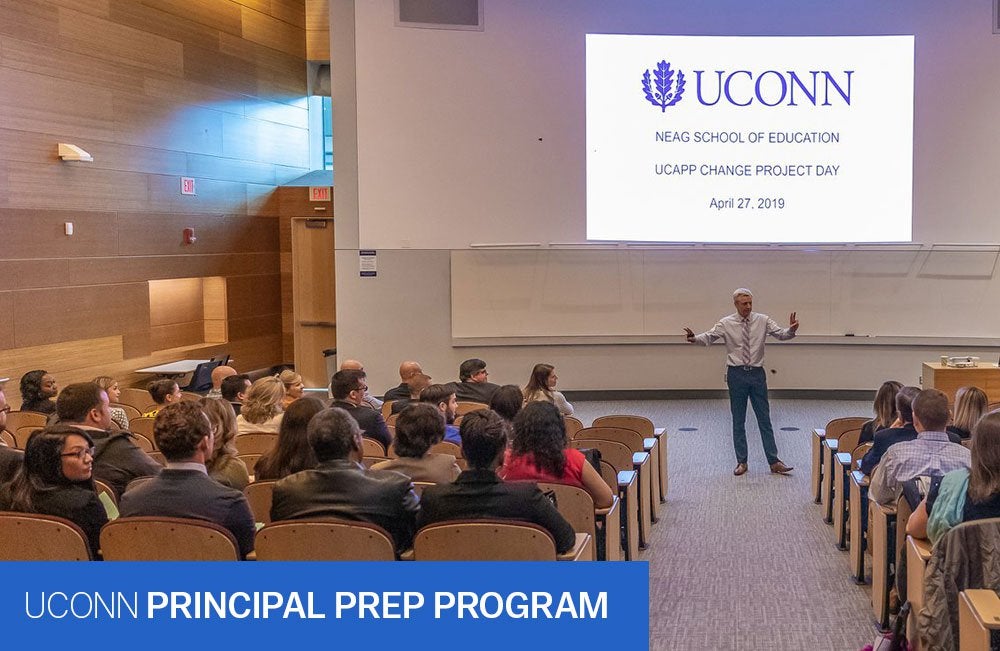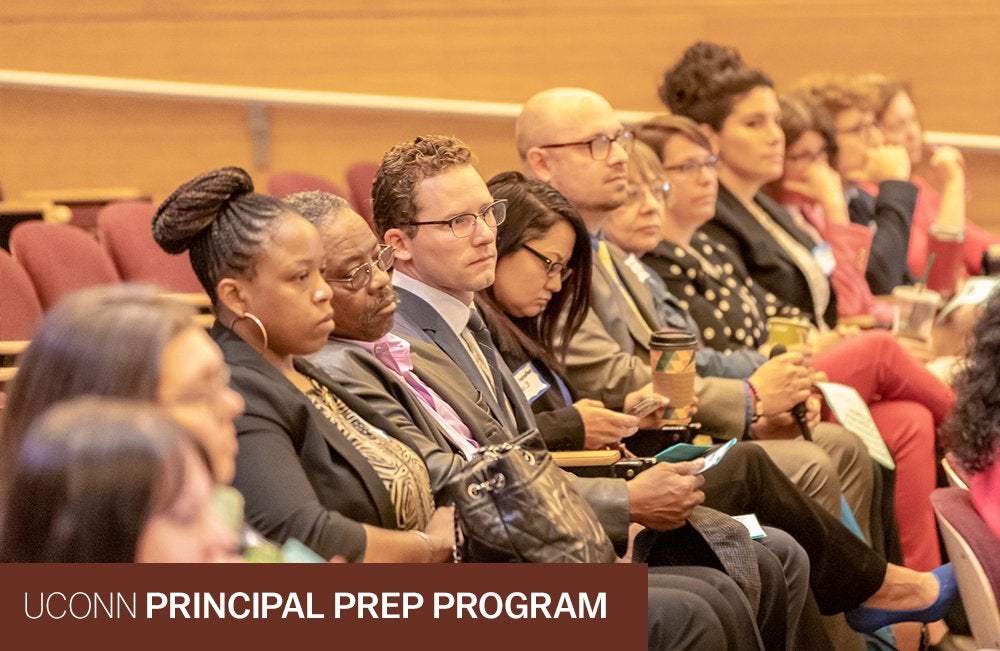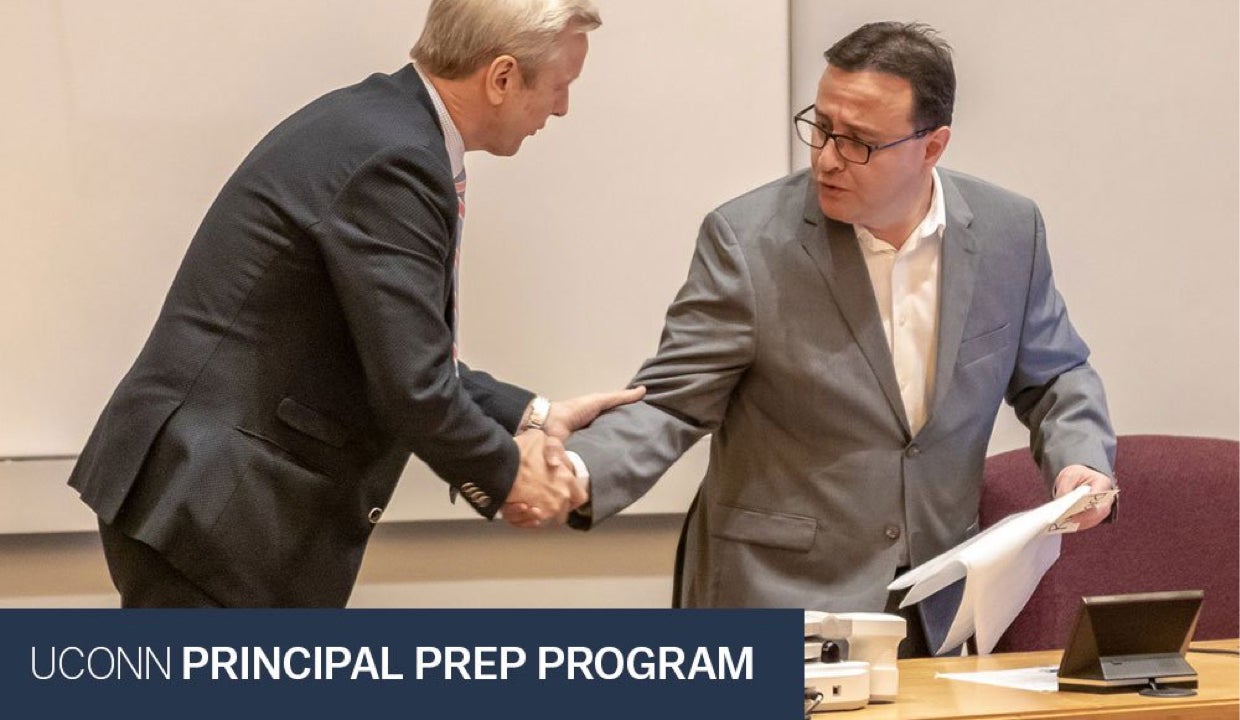This post is part of a series profiling the University of Connecticut’s efforts to strengthen its principal training program. The university is one of seven institutions participating in Wallace’s University Principal Preparation Initiative, which seeks to help improve training of future principals so they are better prepared to ensure quality instruction and schools. A research effort to determine the effects of the work is underway. While we await its results, this series describes one university’s work so far.
These posts were planned and researched before the novel coronavirus pandemic spread in the United States. The work they describe predates the pandemic and may change as a result of it. The University of Connecticut is working to determine the effects of the pandemic on its work and how it will respond to them.
Ask Mark Benigni, superintendent of schools in Meriden, Conn., about the importance of partnerships in education, and he might tell you about Daniel Crispino. Crispino started his career as a first-grade teacher in Meriden Public Schools. His success in that role led the district to tap him for a leadership position and eventually nominate him for a spot in the University of Connecticut’s Administrator Preparation Program (UCAPP). After a one-year program at UCAPP, Crispino returned to the district as an assistant principal. In 2016, he became principal of John Barry Elementary School, which at the time had a “failing” designation from the state. By 2019, Crispino had helped transform the school; it received a National Blue Ribbon Award that year, and Crispino became one of ten principals to receive the Terrel H. Bell Award for Outstanding Leadership. He is now the district’s director of school leadership, where he is helping other principals improve their schools.
Benigni may not be able to retain leaders such as Crispino, he says, without his district’s long-standing relationship with the University of Connecticut. The promise of career advancement through training at UCAPP helps keep talent in the district, despite its limited salaries. “As a small urban district, we can’t pay as well as some suburban communities,” he said. “What we can offer is a really enriching experience working with a college partner.”

That partner is now working to strengthen such ties so it can enhance those experiences and help improve leadership in districts such as Meriden. In 2016, UCAPP joined The Wallace Foundation’s University Principal Preparation Initiative, which supports the redesign of six university programs so they can better train future principals. The initiative calls, in part, for closer partnerships with states, school districts and other community organizations so universities can tailor training to the needs of schools. UCAPP has embarked on a systematic effort to reinforce such ties, with a close, collaborative assessment of needs, establishment of regular communication channels and joint monitoring of results.
“We had had a concerted effort to work with more urban districts in the state,” said Casey Cobb, professor of educational policy at the University of Connecticut, who helped reorient UCAPP’s approach to district partnerships. “But we never had formal partnerships beyond one with the Hartford School District. The Wallace initiative gave us the opportunity to reach out to districts to support their leadership development pathways.”
UCAPP chose to work with three urban districts—Hartford, Meriden and New Haven—with which it has had close and long-standing relationships. “We wanted districts who had both the need and also the capacity to be part of this redesign,” said Jennifer McGarry, the university’s department head in education leadership who also helped manage work in the Wallace initiative. “We wanted people that we knew had a commitment to change and continual improvement.”
Laying out the foundation
The work began with the Quality Measures self-assessment tool, which requires programs to work with school districts to determine whether they are preparing principals to lead teaching and learning in those districts. Based on the results of that assessment, UCAPP developed a general agreement with each district outlining the areas of focus and priorities for their work together.
These agreements are informal and sketch out broad frameworks for the work, such as guidelines for admissions processes, placement of UCAPP students for internships in district schools and protocols for communications among the partners. They were once enshrined in formal memoranda of understanding (MOUs) that UCAPP leaders assumed would help resolve disagreements or miscommunications. UCAPP has learned, however, that their utility can often fall short of the legal and administrative work they require.
UCAPP’s MOU with one district, for example, unraveled with the arrival of a new superintendent whose priorities differed significantly from those of her predecessor. UCAPP had spent three years cultivating the relationship that led to this MOU, working closely with leaders and lawyers to ensure it met all parties’ rules and regulations. Yet, with the arrival of a new district leader, all that work came to naught.
“It became a fragile agreement,” said UCAPP director Richard Gonzales. “Even with the MOU, we couldn't ensure that things were going to go according to those terms.”
UCAPP is therefore bypassing the formalities and focusing more on the spirit than the letter of its agreements. It still uses a self-assessment to determine the broad contours of its work with the districts, but it now relies more on personal ties than on official documents. “Now it’s much less about the written agreement and much more about the relationships,” Gonzales said. “You have to maintain and nurture those relationships. It’s more time-intensive.”
Staying in touch and strengthening ties
UCAPP relies on regular contacts, both formal and informal, to maintain these relationships. It convenes leaders from all partner districts roughly once every fortnight to share information and solve problems. All partners also come together at regular meetings of a professional learning community of participants in the Wallace initiative.
The most obvious benefit of this frequent contact is that it allows UCAPP to adapt and improve its program based on actual needs in schools. One district, for example, said early-career principals were struggling to create leadership teams. UCAPP therefore added to its curriculum to beef up support in that area. Another district was having trouble with teacher turnover. So UCAPP created a three-year program to help high-performing teachers become instructional leaders and help improve classroom performance throughout the district. Chronic absenteeism seemed to be a problem throughout the state. UCAPP responded by incorporating readings, discussions and assignments about absenteeism into its curriculum.
Beyond immediate improvements in UCAPP’s offerings, the frequency of contact is also creating bonds that transcend formal MOUs. Benigni, for example, had been looking for ways to better support his district’s eight elementary-school principals. At a meeting of the Wallace-convened professional learning community, he got the idea to restructure his central office and create a position dedicated to those principals. He saw an opportunity to do so when Miguel Cardona, an assistant superintendent in his district, left to become Connecticut’s education commissioner. With a top spot open, Benigni could shuffle resources and job responsibilities to get his elementary-school principals the support they needed. To help make sure he did it right, he called Richard Gonzales.
Gonzales helped Benigni determine the most efficient ways to restructure the central office and create a new position dedicated to elementary-school principals. He even used his knowledge of philanthropies such as The Wallace Foundation to help Benigni work out how to pay for that position. Benigni introduced the new position to the district in the 2019-2020 school year. It is currently filled by UCAPP graduate Dan Crispino.
“The added partnership puts us more in touch with each other so it’s easier to throw those ideas off each other,” Benigni said. “You become partners, but you become strategic thinkers together as well.”
Such relationships can’t ensure complete agreement among parties. Complications do arise, and UCAPP must work closely with districts to resolve them. For example, Cobb said, a district may place a UCAPP intern in a school that needs more support, not in one that would help that intern become a more effective leader. “It can be a little tricky,” he said of such situations, “but we try to face it head on.” UCAPP advocates for students in such situations. “We know they’re in a tough position,” Cobb added. “They can’t be complaining, they can’t put down other administrators. That’s when we will have a side conversation with the district.”
Tracking outcomes
Such sensitive conversations can be easier when they’re based on data. Leslie Torres-Rodriguez, superintendent of Hartford Public Schools, for example, said that the district was once unable to communicate its needs to UCAPP because it lacked the data to understand those needs itself. “We needed stronger data systems to be able to see how our principals are doing and progressing,” she said. “It felt challenging to us to identify goals for the partnership when our data systems weren’t as strong.”

UCAPP is therefore working with all its partner districts to develop data systems to track the performance and career trajectories of its graduates. These systems will collect key points of data, such as graduates’ areas of strength while they were in UCAPP, the number of UCAPP graduates hired as administrators, the amount of time they spend in those positions and key performance indicators of the schools in which they serve. UCAPP plans to use such systems to identify the strengths and weaknesses of its graduates as they play out in schools. These systems could also help match UCAPP interns and graduates; if data suggest that a certain school needs support in a certain area, UCAPP could help direct graduates with expertise in that area to that school.
"I don’t need a zillion candidates to fill a principal job, I just need the one right person,” Benigni said. “If we can come up with a firm understanding of what makes a leader most effective, and if we can then track the development of those skills, then I’ll know when I’ve got a strong person ready for that job.”
Such systems cannot be bought off the shelf, however. Each district’s systems are different, and to bring them all together, UCAPP would have to sort through several technical and legal complications, such as the nature of the data collected, how they are stored, who owns and maintains them, how they are shared and how all parties can ensure privacy and security.
UCAPP quickly realized that the effort necessary to create a single system across all districts outweighed its potential benefits. Instead, the program forged agreements whereby each district develops its own system but gives UCAPP a standard data report every year. Such an arrangement gives districts the flexibility to collect the data that matter most to them, while allowing UCAPP to aggregate the data it needs to identify broader trends in principal performance and areas in which it may need to adapt.
It also highlights the importance of another partnership: that with the Connecticut State Department of Education.
Support from and for the state
UCAPP can’t gain a full understanding of school needs using data from just three districts. Principals may move from district to district, and UCAPP must track its graduates’ records across districts to fully understand how well it trained them. Instead of negotiating complex data agreements with each of Connecticut’s nearly 200 districts, UCAPP is working with the state department of education to help meet its data needs. The department of education will help UCAPP track the basic essentials throughout the state, and UCAPP will incorporate the more nuanced data it receives from its three partners every year.
UCAPP has forged a close but informal relationship with the state, as it has with its partner districts, beyond such data systems. Commissioner of Education Miguel Cardona says this relationship helps ensure principals are trained to lead schools that principal preparation programs often ignore. “We have students who are dealing with many different things in their life, whether it's through poverty or other issues,” he said. “Historically, the students that graduate from some of the traditional principal preparation programs have had very little experience learning about leadership in communities dealing with these needs.”

State representatives participate in meetings UCAPP convenes with districts and communicate these needs, Cardona said. They also use these conversations to flag important shifts in state policy. Cardona pointed to the example of a recent change from a zero-tolerance policy for misbehavior to a focus on restorative practices, which seek to improve students’ relationships with each other and the community. State staffers signaled that change to UCAPP, and UCAPP tweaked its curriculum accordingly. “Now, pre-service principals are hearing different perspectives and different approaches towards restorative practices being considered in districts,” Cardona said. “So when they go into districts, these approaches are not new. New principals don't hear about them for the first time when they're employed.”
The state also gives UCAPP important context for its efforts. “The state is the best source of historical information for us,” Jennifer McGarry said. The department of education keeps information about interventions in years past, which she says is useful as UCAPP considers new approaches. “We can ask, ‘why did it work? Why did it not work? Is it something we want to revisit, or is it something that’s been done and wasn’t successful?”
Results thus far
Productive partnerships don’t come easy. All parties must stay open to feedback and change. They must balance different viewpoints and sometimes competing needs. And they must secure the resources they need to follow through on commitments. “It's not just one conversation, and then you go back to business as usual,” Cardona said. “It's a constant reflection of what's working, what's not working, what needs attention.”
But that effort may be yielding some early benefits for schools. Benigni, for example, said that more careful consideration of the skills his principals need and his greater familiarity with principal training has helped him ask better questions when he interviews principal candidates. “We’re putting less emphasis on the feel of the interview and more emphasis on the substance of the person,” he said. “There’s a likability factor that comes out in an interview. Sometimes that’s valuable, because being well liked helps you lead. But if you can’t help your teachers get better, that’s going to wear off very quickly.”
Cardona said closer communication with UCAPP and its partner districts is leading the state to reconsider certification policies. “The certification department may be under the assumption that a policy is a really good one,” he said. “But partners will tell us what they’re experiencing, and we might find that it is unintentionally hurting our ability to attract quality candidates. It gives us the opportunity to revisit that policy, see why it is in place and whether or not it's needed.”
Cobb, meanwhile, suggested that UCAPP’s initial self-assessment and its partnership with the state may even prod other programs to improve. “The state convened competing programs to talk about the quality of their own programs through the Quality Measures protocol,” he said. “I thought that was pretty neat.”
Challenges remain, however. One is staff capacity. Changes in personnel can disrupt efforts and partnerships with UCAPP can stretch districts’ financial and human resources. Another is the amount of time it takes to meet partnership commitments. Districts have requests UCAPP has not yet been able to address, and it can take a while for UCAPP to determine how best to squeeze these requests into a packed curriculum.
But the work so far has forced the parties closer together, built trust and, some hope, paved a path for continuous improvement in days ahead. “I define success by creating a culture of interdependence between the University of Connecticut, the districts and the department of education,” Cardona said. “So if this Wallace initiative wraps up, the partnership and the ongoing dialogue are still there.”
Benigni suggests that partnerships may be on their way to accomplishing just that. “We were partners before,” he said. “But now I feel like we may be influencing their work and they may be influencing ours.”
STORIES FROM UCONN PRINCIPAL PREP PROGRAM









